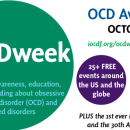Anger and OCD – Getting Mad…
“I hate having OCD! Why can’t these thoughts just stop?!?! How can I be the person I was before?!?!” Many people with OCD are extremely familiar with the anxiety-related aspects of the disorder. OCD is an anxiety disorder after all, so it’s not terribly surprising that anxiety is often core to its experience. But anxiety is certainly not the only emotion that shows up in OCD. I’ve discussed briefly how some people with OCD have symptoms of guilt, shame, disgust, and depression, and how treatment may sometimes need to be modified when these emotions are primary aspects of the disorder. Today, though, I’d like to comment briefly on anger and OCD, which I don’t think I’ve mentioned explicitly in previous posts. Anger can be a powerful force in many people’s OCD. What’s the relationship between anger and OCD? Actually,...
Read MoreERP Tip of the Day #2
It’s ERP tip time. This series of posts focuses on tips to enhance the effectiveness of your exposure and response prevention (ERP). If you’re interested in more ERP tips, click the following link for all the posts in this series. Exposure and Response Prevention (ERP) Tips for OCD Without further ado, here’s another ERP tip to consider when designing your next exposure. ERP Tip #2 When completing your next exposure, avoid rules that dictate what you’re allowed to think during the exposure. If you try to complete an exposure without having a certain bad thought, chances are that you’re setting yourself up to think that very thought. Instead, design your exposure around having that very same unwanted thought. I love it when people with OCD do exposure, but I don’t love it when they have a long list of...
Read MoreERP Tip of the Day #1
Starting today, I am going to start posting random ERP tips as they occur to me, as there are certain roadblocks that many of my OCD patients tend to encounter. If it’s helpful for my patients, maybe it’s helpful for you. If you’re interested in more ERP tips, click the following link for all the posts in this series. Exposure and Response Prevention (ERP) Tips for OCD These posts will probably be a bit shorter unless the concept requires a more thorough discussion. Please feel free to leave comments below, if you need more information. Today’s tip is… ERP Tip #1 Do not label your rituals as ERP. Instead embrace openness, defenselessness, and vulnerability. You might think that you never do this, but it happens more often than you think. Some people that I know will encounter triggers for...
Read MoreImaginal Exposure vs. In Vivo Exposure for OCD
As I’ve talked about in numerous posts, overcoming OCD involves learning to co-exist with doubt and uncertainty. This idea can be a bit counter-intuitive at first, as many people initially expect OCD treatment to reduce uncertainty. One therapeutic approach that helps with this process is exposure and response prevention (ERP) for OCD. Not surprisingly, ERP consists of two parts: 1) exposure, and 2) response prevention. An exposure is when you do something on purpose to provoke an anxiety spike. By definition, exposures are not accidental; rather, they are pre-planned, deliberate offensive strikes against your OCD. Exposures are designed to help you build up your tolerance to fear-producing situations. Exposures are often completed according to an exposure hierarchy, meaning that people typically complete lower level exposures (i.e., less distressing exposures) before gradually working up to higher level ones. Response prevention...
Read MoreOCD Awareness Week 2016
It’s #OCDWEEK! Help raise awareness and understanding about obsessive compulsive disorder (OCD) and related disorders. Welcome to #OCDWEEK 2016, a week organized by IOCDF to help raise awareness about OCD and related conditions! If you visit IOCDF’s website, you’ll find information about local and online programs and events designed to help increase the general public’s understanding of OCD. When I started this blog a few years ago, the internet was awash in misinformation about the nature of OCD. OCD was (more often than not) described in oversimplified terms, and the popular media largely mischaracterized OCD as a disorder defined primarily on the basis of excessive washing or checking behaviors. If you didn’t fit this mold, it was implied that you didn’t have OCD. I was hoping that, through my writing, I might be able to address some of these...
Read More







